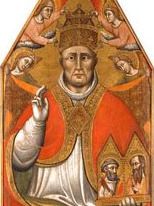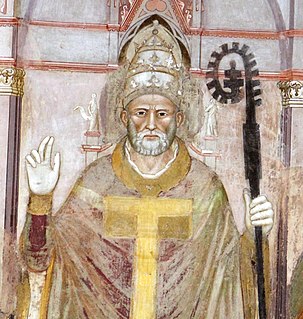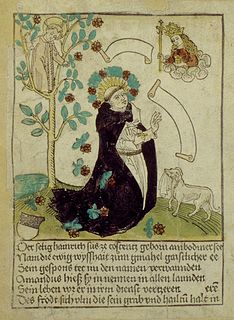
The Dominican Order, formally known as the Order of Preachers, is a mendicant order of the Catholic Church founded in Toulouse, France, by the Spanish priest Saint Dominic. It was approved by Pope Honorius III via the Papal bull Religiosam vitam on 22 December 1216. Members of the order, who are referred to as Dominicans, generally carry the letters OP after their names, standing for Ordinis Praedicatorum, meaning of the Order of Preachers. Membership in the order includes friars, nuns, active sisters, and affiliated lay or secular Dominicans.

Emperor Go-Kōgon was the 4th of the Emperors of Northern Court during the Period of the Northern and Southern Courts. According to pre-Meiji scholars, his reign spanned the years from 1352 through 1371.

Pope Urban V, born Guillaume de Grimoard, was the head of the Catholic Church from 28 September 1362 until his death in 1370 and was also a member of the Order of Saint Benedict. He was the only Avignon pope to be beatified.

Pope Innocent VI, born Étienne Aubert, was head of the Catholic Church and ruler of the Papal States from 18 December 1352 to his death in 1362. He was the fifth Avignon pope and the only one with the pontifical name of "Innocent".

Year 1300 (MCCC) was a century leap year starting on Friday of the Julian calendar, the 1300th year of the Common Era (CE) and Anno Domini (AD) designations, the 300th year of the 2nd millennium, the 100th and last year of the 13th century, and the 1st year of the 1300s decade. The year 1300 was not a leap year in the Proleptic Gregorian calendar.

Munio of Zamora, O.P., was a Spanish Dominican friar who became the seventh Master General of the Dominican Order in 1285, and later a bishop.

Saint Dominic, also known as Dominic of Osma and Dominic of Caleruega, often called Dominic de Guzmán and Domingo Félix de Guzmán, was a Castilian Catholic priest and founder of the Dominican Order. Dominic is the patron saint of astronomers.
John Bromyard was an influential English Dominican friar and prolific compiler of preaching aids.

Hugh of Saint-Cher, O.P. was a French Dominican friar who became a cardinal and noted biblical commentator.
Francis Fernándezde Capillas, O.P., was a Spanish Dominican friar who went as a missionary to Asia. He died in China as a martyr. He was canonized by Pope John Paul II on 1 October 2000, as one of the 120 Martyrs of China.

Henry Suso, was a German Dominican friar and the most popular vernacular writer of the fourteenth century. Suso is thought to have been born on March 21, 1295. An important author in both Latin and Middle High German, he is also notable for defending Meister Eckhart's legacy after Eckhart was posthumously condemned for heresy in 1329. He died in Ulm on 25 January 1366, and was beatified by the Catholic Church in 1831.

Raymond of Penyafort, OP, was a Catalan Dominican friar in the 13th century, who compiled the Decretals of Gregory IX, a collection of canonical laws that remained a major part of Church law until the 1917 Code of Canon Law abrogated it. He is honored as a saint in the Catholic Church and is the patron saint of canon lawyers.

Edward Dominic Fenwick, O.P. was an American prelate of the Catholic Church, a Dominican friar and the first Bishop of the Diocese of Cincinnati.

Diego Durán was a Dominican friar best known for his authorship of one of the earliest Western books on the history and culture of the Aztecs, The History of the Indies of New Spain, a book that was much criticised in his lifetime for helping the "heathen" maintain their culture.

John of Wildeshausen, O.P., also called Johannes Teutonicus was a German Dominican friar, who was made bishop of Bosnia and later the fourth master general of the Dominican Order.
Humbert of Romans was a French Dominican friar who served as the fifth Master General of the Order of Preachers from 1254 to 1263.
Blessed John of Vercelli, O.P., was the sixth Master General of the Dominican Order (1264-1283).

Prior is an ecclesiastical title for a superior, usually lower in rank than an abbot or abbess. Its earlier generic usage referred to any monastic superior. The word is derived from the Latin for "earlier" or "first".
The Blessed John of Parma, O.F.M. was an Italian Franciscan friar, who served as one of the first Ministers General of the Order of Friars Minor (1247–1257). He was also a noted theologian of the period.
The Third Order of Saint Dominic, also referred to as the Lay Fraternities of Saint Dominic or Lay Dominicans since 1972, is a Roman Catholic third order affiliated with the Dominican Order.













